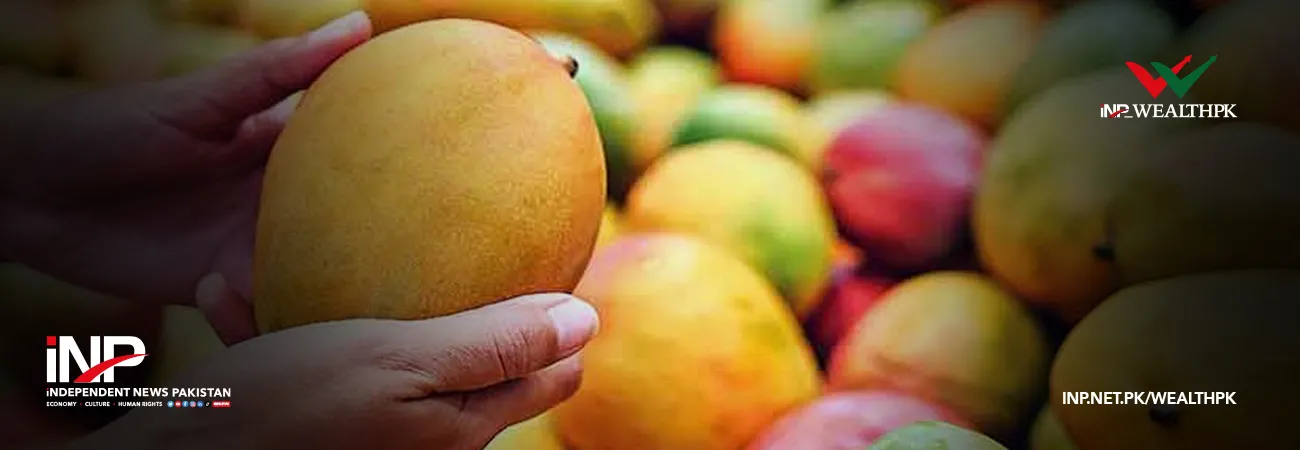INP-WealthPk
Azeem Ahmed Khan
Pakistan, known as one of the world's largest and best mango producers, has an untapped opportunity that could potentially bring in billions of dollars in revenue -- exporting dried mangoes. This valuable insight came from a technology expert who believes that Pakistan's mango industry can significantly benefit from value-added products like dried mango slices and mango leather.
"Dried mango, a popular value-added product among major mango-growing countries, is yet to make its mark in Pakistan's agricultural landscape," said Muhammad Arshad, CEO of Pamico Technologies, while talking to WealthPK. The process involves dehydrating mango slices, which are then supplied to both local and international markets.
"This venture does not require a heavy initial investment and is feasible for medium-level farmers and contractors," he said. An alternative product, known as mango leather, is also created by converting mango pulp into a dried form. "This variation adds diversity to the range of products that could be derived from mangoes," Arshad said.
The dry products are especially in demand when mango season is off and they are not available in the market. The technology expert pointed out that despite being the seventh largest exporter of fresh mangoes globally, Pakistan's farmers are not reaping the financial benefits they deserve.
“The Philippines, for instance, earned a remarkable $2 billion from exporting value-added mango products in 2012, while Pakistan's value addition to its 1.8 million tonnes of annual mango produce remains almost negligible,” he mentioned. “Only 150,000 tonnes of fresh mangoes, and very few processed mangoes are exported,” Arshad said.
He said his company is on a mission to transform Pakistan's mango industry by promoting agripreneurship and offering indigenous agri value-adding technologies. It aims to enable farmers to transit from traditional farming to producing high-value processed products. “The vision is to have numerous farmers producing processed mango products on a significant scale, thereby enabling Pakistan to accommodate large international orders," he said.
According to Arshad's calculations, a company that produces 100 tonnes of dried mangoes can potentially generate a revenue of Rs60 million within a year. “Imagine if there were 100 companies, each producing 100 tonnes of processed mangoes during the mango season, Pakistan could then cater to significant international orders, potentially reaching orders in thousands of tonnes,” he elaborated. However, the current capacity of Pakistan falls short of meeting such substantial orders.
“Yet with global connections becoming easily accessible in the digital technology era, entrepreneurs can establish themselves in only two to three years,” he said. Dried mango products have numerous advantages over fresh mangoes in terms of transportation and storage. “Fresh mangoes require air shipping due to their perishable nature and limited shelf life,” Arshad said.
In contrast, he said, dried mangoes can be stored up to a year and shipped via sea. This shift not only reduces transportation expenses, but also provides more time for finding suitable markets, thereby potentially increasing profits. Citing an example, he pointed out that processing 100,000 tonnes of fresh mangoes can yield 10,000 tonnes of dried mangoes.
The cost-effectiveness of exporting 10,000 tonnes of dried mangoes by sea is more than ten-fold compared to shipping 100,000 tonnes of fresh mangoes by air. Apart from dried mangoes, Arshad identified another "hidden treasure" within mangoes: the seeds. A significant portion of the annual mango production consists of mango seeds, which contain valuable kernel oil. This oil, widely used in the cosmetic industry, can yield substantial returns in the international market.
Arshad regretted that Pakistan currently only uses mango seed for either growing plants or burning it for fuel. Arshad mentioned that kernel oil holds the potential to fetch prices ranging from Rs12,000 to Rs18,000 per litre in the global market. "It's disheartening to observe that while Pakistan possesses the resources, technology, technical support, financial infrastructure, and potential clients, the farmers are currently missing out on an opportunity that could significantly enhance their earnings," he said.
He advocated for a shift towards mechanisation and value addition in the agriculture sector, citing the wastage of 30-40% of fruits and vegetables annually due to a lack of preservation methods. He said that by establishing value-added processing facilities, Pakistani industries could produce a large number of other food products of fruits and vegetables, liquid foods, and dry fruits, including gauva, strawberries, plums, dates, peaches, apricots, sherbet berries, raisins, bananas, bitter gourd, tomato, spinach, ladyfinger, onion, potato, fenugreek, mint leaves, etc.
About the consumption of dried products, he explained that fruits can be enjoyed in their dried form, whereas vegetables require rehydration through cooking with water. "Upon rehydration, these products will retain their original fresh-like flavours," he added.
Credit: INP-WealthPk













